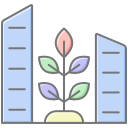This website uses cookies so that we can provide you with the best user experience possible. Cookie information is stored in your browser and performs functions such as recognising you when you return to our website and helping our team to understand which sections of the website you find most interesting and useful.
The Role of Technology in Sustainable Urban Gardening
Urban gardening has experienced a transformative shift in recent years, largely driven by the integration of innovative technologies. As cities grow denser and the demand for green spaces intensifies, technology is proving pivotal in making urban gardening more accessible, efficient, and environmentally sustainable. From precision monitoring tools to smart irrigation systems, digital applications now empower urban dwellers to cultivate thriving gardens even in limited spaces. By harnessing these advancements, sustainable urban gardening not only optimizes resource use but also supports local food production, enhances biodiversity, and contributes to healthier urban communities. This web page explores the multifaceted impact of technology on sustainable urban gardening, examining how digital innovation shapes the future of urban green spaces.


